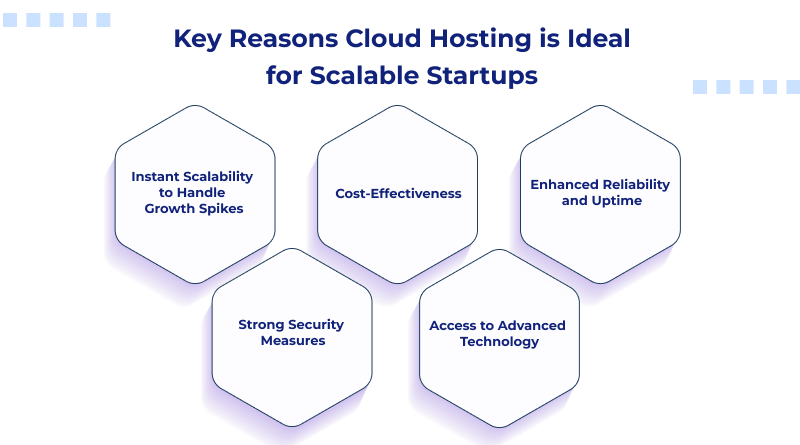“The cloud is not just a technology shift; it’s a business transformation.” – Diane Greene, Former CEO of Alphabet Inc.
Whether you are building a startup or a big organization, every move determines the future. Work on the right budgets, race against time, and dream big to achieve success. Now, every organization builds an online presence, and therefore, they opt for web hosting services. Building an online presence bridges the communication and connectivity gap between customers and brands.
But at first glance, conventional web hosting seems more straightforward to start for the growing user base. However, scalability is limited. Therefore, cloud web hosting with excellent flexibility, power, and scalability comes in for modern startups. Alternatives like cheap cloud hosting servers are available for budget-conscious startups. So, there is no point in ignoring the web hosting service.
Think about it: Today’s startups don’t just need a website or an app — they need a platform that can expand at lightning speed without breaking the bank. Whether you’re launching a new SaaS product, an e-commerce store, or a social app, cloud hosting gives you the backbone to support your growth journey. In this blog, we’ll dive deep into why cloud hosting is the perfect fit for startups aiming to scale innovative and fast.
Table Of Content
What is Cloud Hosting and Why Startups Prefer It?
Cloud hosting seems like magic for startups. Here’s why!
– Quick Definition of Cloud Hosting
Cloud web hosting is a hosting service where data, applications, and resources are distributed across multiple servers instead of relying on a single machine. This interconnectivity forms a cloud network, allowing startups to access scalable computing power, storage, and bandwidth on demand. In this, businesses don’t have to pay a heavy upfront investment. Such architecture reduces the downtime risk, supports traffic surges effectively, and ensures faster and more reliable user experiences for a critical startup’s success.
Real-world note: Dropbox, a startup that began as a simple file-sharing platform, initially leveraged cloud infrastructure to rapidly scale without owning physical servers — a move that saved them significant operational costs and accelerated their growth.
How Cloud Hosting Supports Modern Startup Needs?
Startups quickly move, adapt, and scale. Therefore, cloud hosting is built for precisely that. Gartner reports more than 85% of organizations will adopt cloud-first technology by 2026 because of the agility and cost-effectiveness. For startups, it eliminates the need for expensive infrastructure of a dedicated server.
Many cloud providers like AWS (Amazon Web Services) integrate CDN and built-in security protocols and help startups. If you want to focus on the core vitals of your business and want a third-party service provider to manage the infrastructure, opt for the Managed AWS hosting services from us. In this, users experience the difference by migrating to our AWS cloud servers!
Stay ahead of the competition with unmatched scalability, flexibility, and cost optimization. Upgrade your online presence without breaking the bank, leaving all server-related headaches behind!
Key Reasons Cloud Hosting is Ideal for Scalable Startups
Cloud hosting excels as a good web hosting offer for startups due to its flexibility. But it is beyond flexibility.

1. Instant Scalability to Handle Growth Spikes
Cloud hosting offers a significant scalability advantage to the startups. It provides the potential to scale resources as demand increases. Unlike conventional hosting, you have to predict future resource requirements and invest upfront. Cloud hosting services allow you to adjust resources like memory, storage, and bandwidth in real-time. The McKinsey report states that startups that integrate cloud hosting services help grow website traffic by 26% compared to conventional hosting.
Slack is the best example to consider. It is the best communication platform, experiencing rapid adoption among tech companies. By using cloud infrastructure, Slack was able to onboard millions of users without facing system outages. For startups chasing fast growth, instant scalability isn’t a luxury — it’s a necessity for survival and delivering consistent user experiences.
2. Cost-Effectiveness
For startups, smart budgeting is essential. Conventional web hosting requires a significant upfront investment in hardware and infrastructure. In contrast, cloud hosting follows a pay-as-you-go model. You pay only for what you use, meaning you can start small and expand as needed without burning a hole in your pocket.
Moreover, by eliminating the need for in-house servers and maintenance teams, startups can redirect valuable resources toward innovation and growth. The cost efficiency of cloud hosting helps minimize financial risks, allowing entrepreneurs to test new ideas and scale operations without the fear of overspending.
3. Enhanced Reliability and Uptime
Frequent website downtime hurts the startup’s reputation. Cloud hosting offers superior reliability by distributing resources across channels. If one server goes down, another automatically takes over. It reduces downtime and ensures your website or app remains accessible to users at all times.
Speed and availability are the expectations in this competitive world. Hence, the consistent uptime is crucial. Cloud hosting infrastructure is designed with redundancy and backup in mind. It gives startups the reliability they need to build trust, keep users happy, and maintain a professional brand image from the beginning.
4. Strong Security Measures
Security is non-negotiable for startups, especially those handling sensitive data. Leading cloud web hosting providers offer robust security protocols, including data encryption, DDoS protection, regular security patches, and real-time threat monitoring. These measures easily reduce the vulnerability that derails young businesses.
Moreover, cloud services adhere to industry compliance standards like GDPR, HIPAA, and PCI-DSS. For startups, leveraging the security expertise of top-tier cloud providers means they protect their assets and customer data without having to build complicated systems from scratch, ensuring peace of mind while focusing on growth.
5. Access to Advanced Technology
Startups utilize cloud hosting to gain access to new technologies like AI integrations, machine learning, big data analytics, and even IoT support. These are necessary tools for businesses that want to innovate and personalize customer experiences to remain competitive in a fast-evolving marketplace.
With the cloud hosting platform, startups have the opportunity to experiment with the new technology without the commitment of investing heavily upfront. Most cloud tech providers offer flexible APIs and development platforms, allowing startups to develop their products with advanced features. This would allow capacity for faster innovation cycles and enable startups to move quickly to introduce bolder ideas to a competitive marketplace.
Real-World Examples: Startups That Scaled with Cloud Hosting
Cloud hosting has been a game-changer for real-world startups. Let’s reveal how!
– SaaS Startups Handling Viral User Growth
SaaS startups usually experience unpredictable user growth, especially after launching on product discovery platforms like Product Hunt or receiving media attention. For instance, the virality of Product Hunt was so much that the user base tripled in 72 hours amid the pandemic. They handled such a user base because they hosted their applications on a cloud platform with auto-scaling capabilities. The team was unable to handle any downtime, ensuring a seamless experience for new users. Without cloud hosting, the sudden surge could have resulted in server crashes, performance lags, and loss of credibility.
Cloud hosting enables SaaS startups to change demands passively. With monitoring and elasticity integrated, the hosting infrastructure allocates additional resources as it sees fit in real time, avoiding underperforming experiences and over-provisioning. That level of changeability has become a true advantage for lean SaaS businesses that can invest in product development and depend on their cloud providers to be up and available and consistently federate performance under strain.
– E-commerce Startups Scaling During Festive Sales
E-commerce startups often experience critical moments during the holiday or sales seasons. One notable fashion brand, Myntra, has experienced a 600% traffic surge during the Diwali Sale 2023. Thanks to CDN (Cloud Delivery Network) and load balancing, their website stayed fast and responsive despite the massive influx. The startup not only maintained uptime but also increased conversions due to faster page loads, proving the strength of cloud infrastructure in high-demand scenarios.
Such cases reflect why leading cloud service providers are backed by e-commerce brands worldwide. Their ability to offer geographically distributed servers, caching, and automated resource allocation ensures stability and reliability under extreme loads. These real-world events validate cloud hosting as a trusted and authoritative solution for startups that cannot afford downtime or poor user experience when it matters most.
How to Choose the Right Cloud Hosting Provider for Your Startup?
Startups can follow these pointers to find a reliable cloud web hosting service provider.
- Technical Features: Cloud hosts must align with the startup’s technical configurations. Cloud servers handle unpredictable traffic spikes. SSD storage is another crucial feature offering a fast read/write speed that significantly boosts application and website performance.
- Developer-Friendliness: It is a significant consideration. Git integrations, staging environments, container support, and APIs for seamless workflow automation are some developer tools required by startups.
- 24×7 Support: Technical support of cloud hosts troubleshoots glitches if they occur. It lays the foundation of disaster-proof infrastructure.
- Reputation: Startups should not ignore the reputation and security track record of a cloud web hosting provider. Look for the compliance certifications like ISO 27001, SOC 2, GDPR, HIPAA, or PCI-DSS. These certifications demonstrate that the provider adheres to global standards in data protection and privacy, making them a trustworthy partner in your startup journey.
- Customer Reviews: Dig the customer testimonials and third-party ratings of cloud hosts. Closely evaluate how they handle queries, manage updates, and avoid downtimes. You can research more on platforms like Quora, Reddit, or tech forums. Transparency, both in terms of pricing and service-level commitments, reinforces trust and helps startups avoid unexpected issues as they scale.
If you’re a startup owner, irrespective of the industry, a startup focused on sustainable success and scalability isn’t merely a technical upgrade to cloud hosting; it is a strategic decision. No more waiting for IT provisioning, waiting for random resource consumption to scale, reliable high-security practices, and keeping costs in line creates the right environment for novel growth and expansion. With MilesWeb, startups get much more than cloud infrastructure; they get a trusted partner, one that has a strong commitment to performance, flexibility, and ongoing, dependable support 24/7.
MilesWeb’s cloud hosting solutions are developed with growth, agile teams, and evolving businesses in mind. Our entire service, from auto-scalable resources, SSD-integrated storage, and a whole suite of developer tools, is created to help startups move quickly without worrying about downtime or bandwidth-limited capabilities. If you are a startup ready to map your growth strategy without limits, it’s time to consider cloud hosting from MilesWeb, where reliability and affordable pricing meet your needs.
FAQs
How easily can a startup scale its resources with cloud hosting?
Scaling resources with cloud hosting is very easy. You can quickly increase storage, bandwidth, and computing power on demand as your startup grows, paying only for what you use.
How does the pay-as-you-go cloud benefit startups with fluctuating needs and budgets?
The pay-as-you-go model benefits startups with fluctuating needs and limited budgets. You pay only for the resources you consume, optimizing costs during periods of lower demand.
How does the cloud enable quick app deployment and testing?
Cloud hosting allows startups to deploy and test new applications or features rapidly. It eliminates the need for significant infrastructure changes, accelerating development cycles.
How does distributed cloud infrastructure ensure high uptime?
The distributed nature of cloud infrastructure ensures high uptime and reliability. Redundancy across multiple data centers minimizes downtime for critical applications and websites.















